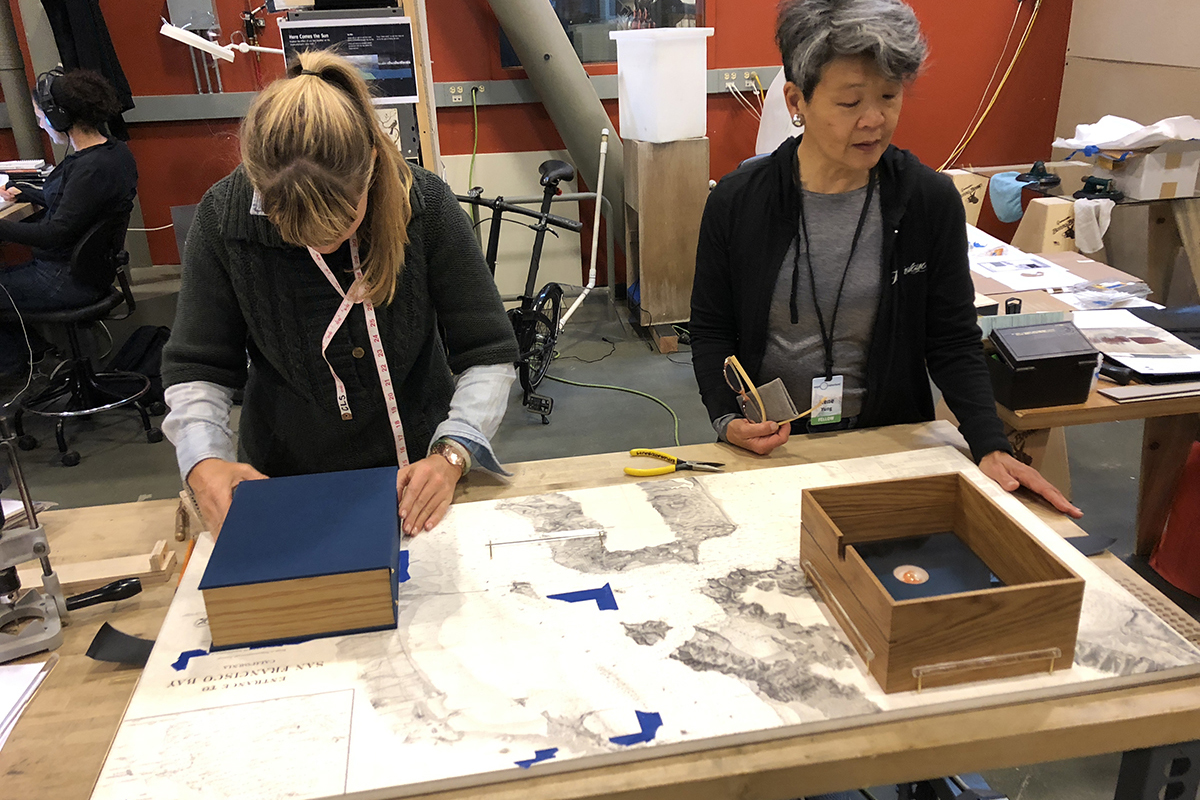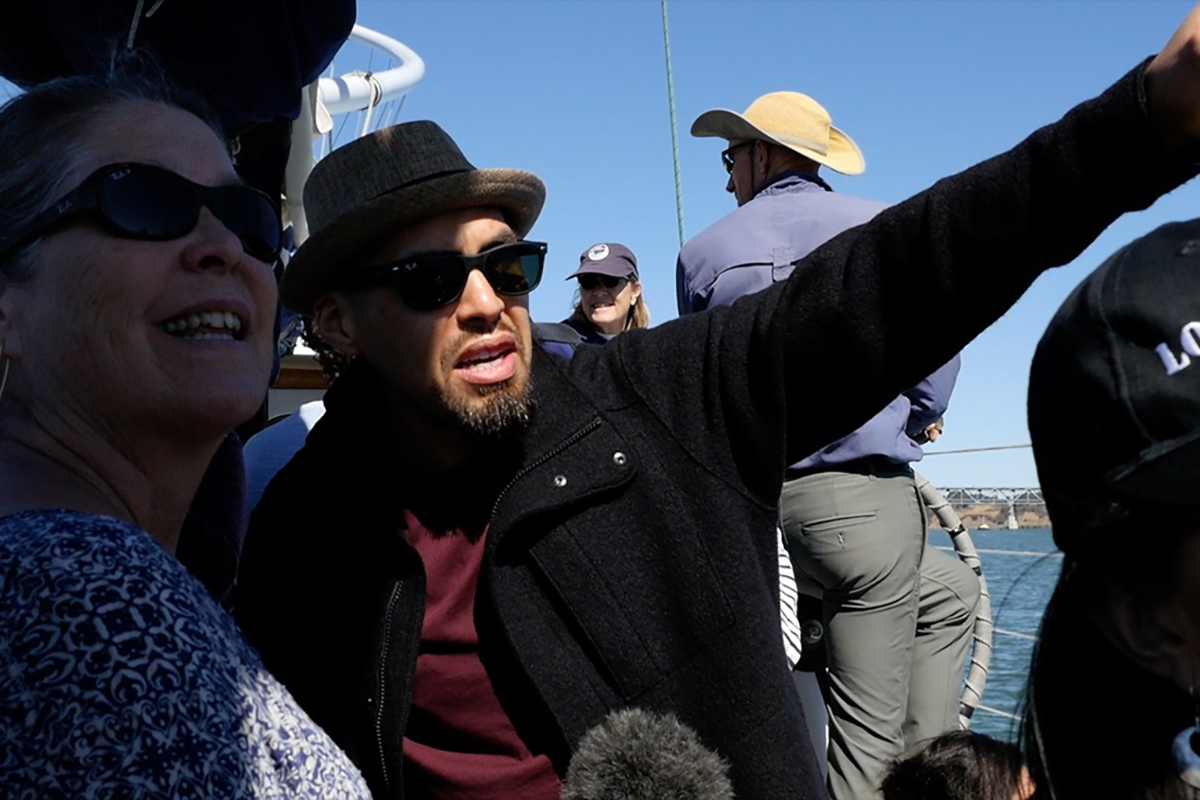Urban Fellows
Jane Wolff – 2013 is an associate professor at the Daniels Faculty of Architecture, Landscape, and Design at the University of Toronto, Canada. Her work explores cultural landscapes dealing with the hybrid ecologies formed by interactions between environmental processes and human intervention. Jane began working with the Exploratorium in 2008 as an artist-in-residence where she began research for the development of a visual dictionary exploring the landscape visible from the Bay Observatory at the Exploratorium’s new home at Piers 15 and 17. She became the first Urban Fellow in 2013 and from her initial research developed Bay Lexicon, a field guide to San Francisco’s shoreline and a work of activist scholarship. It is a case study in the development of a nuanced vocabulary for observing San Francisco Bay using drawing and writing to define complex landscape terms. Bay Lexicon exists both as a physical artwork, in the Bay Observatory and will be published in 2021, by McGill-Queens University Press. Jane and was instrumental in contributing many of the early concepts for the Bay Observatory working closely with staff and participated in numerous talks, workshops and planning sessions. With Matthew Booker and Susan Schwartzenberg, Jane collaborated on the concept and development of the – Bay As It Is Symposium after Ed Ricketts, 2017
Matthew Booker – 2014 is an environmental historian and author of, Down By the Bay, San Francisco Between the Tides. He is Associate Professor of History at North Carolina State University, where he founded the Visual Narrative research program. Matthew’s fellowship launchedwith an advisor & local colleague gathering that included a visit with Jane Wolff. Matthew and Jane shared a strong interest in ways we could strengthen our ability to address contemporary Bay Area environmental issues of climate change and sea level rise as well as ways to further engage historical, social and political issues in our museum context. Matthew deepened our understanding of the human connection to the Bay – how people in the 19th and early 20th century considered the Bay as a commons – and the rocky transition into the corporate control of the Bay’s resources. Matthew engaged with staff and did research in the Observatory. He also brought scholars and potential funders into our realm broadening our circle of friends and colleagues. He advised us on a new visualization for our topographic table called Changing Shorelines – a history of sea level change in the Bay Area, from 18,000 years ago with future projections of sea level rise. Matthew authored, Observing San Francisco Bay, essay # 3, 2016. His public talks included, The Edible Bay, A History of Our Relationships with Local Foods, Intimacies of Time and Place, Reading San Francisco Bay, with Jane Wolff. Matthew and Jane were the principle designers of the Bay As It Is Symposium, after Ed Ricketts in 2017.
Jason Groves – 2015 is a Germanic scholar (University of Washington, Seattle) whose work uses 19 and 20th century German thinkers, who through their literary writings sought to open up the imagination to a geological time scale. He explores how this work might help us better understand our place in life on Earth and our unique human response-ability for the planet. Jason worked with the Observatory team throughout the summer of 2015. He developed a pathway through the Exploratorium culminating in the Bay Observatory exploring the anthropocene as could be expressed in specific exhibits, views and found objects and experiences. Jason profoundly connected to the staff and contributed much to our transition from the local landscape to considering “deep” time (geologic time) and the human impact on the environment. He proclaimed that the Bay Observatory be renamed – the Anthropocene Observatory. Jason participated in several events and curated several talks including, Can Poetry Save the Bay.
Pireeni Sundaralingam – 2016 is a cognitive scientist, researcher, poet and playwright who was a principal advisor on Human Potential for the Museums of the United Nations. Pireeni began her fellowship in the summer of 2016 by organizing a public program with 100 Japanese youth (on a scholarship program to the US) who had experienced the earthquake, tsunami and the nuclear accident in Fukushima in 2011. Designated as Youth Ambassadors learning to find hope after disaster – this program brought American and Japanese youth together in a series of presentations, workshops, poetry and dialogue to consider ways to persevere in this age of climate uncertainty. Pireeni further curated a series of panels and programs on the importance of language and observation in organizing human actions regarding climate change. She participated in numerous programs during her Fellowship and authored, Observing the Observer: The Observatory as incubator for Resilience, as essay # 8.
Sara Dean – 2017 is a designer and architect in the Bay Area. She is co-founder of IF/THEN Studio, a collaborative community platform in Berkeley. She is also Chief Designer at Modern Empathy, a universal-design line of homes. Her work considers the implications of emerging digital technologies on public engagement and urban life in the Anthropocene. Dean worked with the Exploratorium in two capacities: one as an Urban Fellow and another as an artist in a project entitled Artistic Practice Toward Urban Resilience (APUR). These combined efforts produced the Climate Compass project that will be launched in 2021. The Climate Compass is a large decal installed on the ground. Standing on the Compass, one may face north, towards the shore, or the hills, and see the predictions for sea level rise at that site. Climate data from RiSER (a project of the University of California, Berkeley) is combined with this installation to bring climate science more directly into the public conversation. This project was in conjunction with BART and the San Francisco Department of Recreation and Parks. Climate Compass installations will eventually be at four BART stations that are at particular risk for sea level rise, as well as at the foot of Market Street and on the Embarcadero in front of the Exploratorium.
Rene Yung – 2018 is an internationally exhibiting artist, designer, writer, and thinker, whose poetic and incisive works fluidly cross disciplines to address social and cultural issues in the globalized environment. Yung’s fellowship centered on researching the historic shrimp fishing community that once thrived on the margins of SF Bay in the late 19th and early 20th century. Her investigation concentrated on ways to bring this forgotten history into the regional discussion of sea level rise. This work led to an installation—and now public exhibit—for the Bay Observatory on the stories of the Chinese shrimpers who struggled to make a living despite discrimination and racism. Rene is passionate about bringing cultural history into sea-level rise adaptation planning, and has participated in numerous discussions with Observatory staff, our professional colleagues and the other Urban Fellows. Yung’s Retracing the Chinese Shrimp Fishery of San Francisco Bay was published in Fall 2019 as the 10th essay in the Fisher Bay Observatory essay series. She is the founder and executive director of Chinese Whispers, http://chinese-whispers.org.
mak- ‘amham/Ohlone Café, Vincent Medina and Louis Trevino 2021 Vincent and Louis are the founders of the Ohlone Café. They are both members of traditional Ohlone communities. Vincent is Cochenyo and a member of the Muwekma Ohlone Tribe, and Louis is a member of the Rumsen Ohlone community. Both work to revive their cultural traditions and languages. The Ohlone café is a pop-up restaurant specializing in traditional foods. The menu changes seasonally with ingredients gathered by Native people in Ohlone territory. Vincent and Louis begin their fellowship in the spring of 2021 and will be working both with the Bay Observatory and the Living Systems Galler





